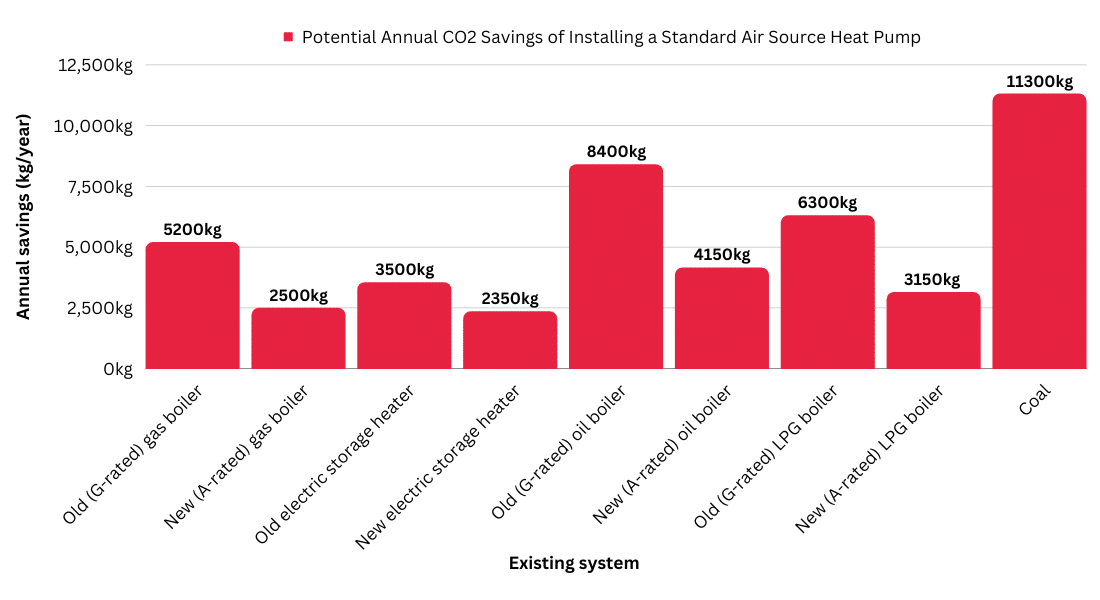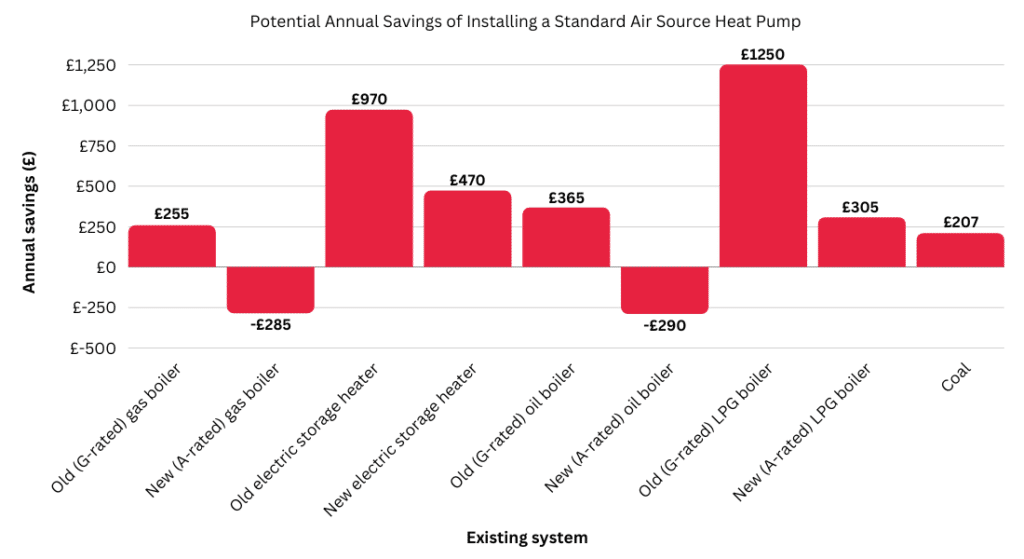Introduction..
Air source heat pumps have been steadily making their way into more European homes over the past decade, empowering thousands of households to lower their energy bills while reducing their carbon emissions.
Making the decision to switch from a gas boiler to a heat pump can be daunting – but taking the first step sooner rather than later can be hugely rewarding. Here are five reasons to start your installation journey today.
Switching from a gas boiler to a heat pump offers several advantages, both in terms of environmental impact and energy efficiency. Here are some reasons why people consider making this switch which we will now delve into below!
Energy Efficiency:
Heat pumps are known for their high energy efficiency. They can produce more energy for heating or cooling compared to the electricity they consume. While gas boilers have an efficiency rating typically between 70% and 90%, heat pumps can achieve efficiencies above 300% or even higher. This means that for every unit of electricity used to power a heat pump, you can get three or more units of heat energy.
Environmental Friendliness:
Heat pumps are considered more environmentally friendly compared to gas boilers because they produce lower carbon emissions. Gas boilers burn fossil fuels, releasing carbon dioxide (CO2) and other greenhouse gases into the atmosphere. In contrast, heat pumps extract heat from the air, ground, or water, which requires electricity but doesn’t generate direct emissions at the point of use. If the electricity comes from renewable sources, the overall carbon footprint can be significantly reduced.

Renewable Energy Compatibility:
As the global energy sector transitions towards renewable sources, heat pumps can easily integrate with clean energy systems. By using electricity from renewable sources such as solar or wind power, a heat pump’s heating or cooling function becomes entirely carbon-free and helps reduce reliance on fossil fuels.
Long-Term Cost Savings:
Although heat pumps may have higher upfront costs compared to gas boilers, they can offer long-term savings on energy bills. The increased energy efficiency of heat pumps means that they require less electricity to produce the same amount of heating or cooling as a gas boiler. Over time, these savings can offset the initial investment and result in reduced energy costs.

Versatility:
Heat pumps can provide both heating and cooling, offering year-round comfort. They can be used for space heating, water heating, and even pool heating. Gas boilers, on the other hand, primarily provide space heating and require separate systems for cooling, such as air conditioners.
Phasing out:
Gas boilers are being phased out across Europe. Although the EU has not yet announced a ban on gas boilers, many countries are taking matters into their own hands when it comes to decarbonising home energy. Germany will ban gas and oil heating in new or renovated buildings from next year, and gas boilers will be banned in new home developments in the UK from 2025.
Safety:
Heat pumps eliminate the need for combustion, as they do not burn fuel internally like gas boilers. This reduces the risk of gas leaks, carbon monoxide poisoning, and potential fire hazards associated with gas-based heating systems.
Durability and Lifespan:
Heat pumps generally have a longer lifespan compared to gas boilers. While gas boilers typically last around 10-15 years, heat pumps can last up to 20 years or more with proper maintenance. This can result in fewer replacements and cost savings in the long run.
No Need for Fuel Storage:
Heat pumps rely on electricity, eliminating the need for on-site fuel storage such as gas tanks. This can free up space and remove the need for fuel deliveries.
Quiet Operation:
Heat pumps operate quietly, providing a more peaceful and comfortable environment compared to gas boilers, which often produce noise during operation.
Government Incentives:
In many countries, there are government incentives, grants, or tax credits available to encourage the adoption of energy-efficient and renewable technologies such as heat pumps. These incentives can help offset the initial cost of purchasing and installing a heat pump system.
Future-Proofing:
As regulations and policies focus on reducing greenhouse gas emissions and promoting sustainable practices, transitioning to a heat pump aligns with the global push towards decarbonization. By making the switch now, you are positioning yourself for a sustainable and energy-efficient future, potentially avoiding the need for costly retrofits or replacements later.
Your Next Steps.
Remember, it’s essential to consider factors specific to your situation, such as the climate you live in, the size of your property, and the availability and cost of electricity, when deciding to switch from a gas boiler to a heat pump. Consulting with professionals in the field can help you make an informed decision based on your unique circumstances.
Want to start cutting your emissions as soon as possible? Our team can provide you with quotes to compare the best prices and all you have to do is get in touch with us, and you can get a head start on the UK’s heat pump revolution.
After all, Your Green Future Starts Here!
Get in touch and request a FREE site survey!
Article Content
Recent Articles
Newsletter Sign Up
Keep up to date with latest news and industry insights.





